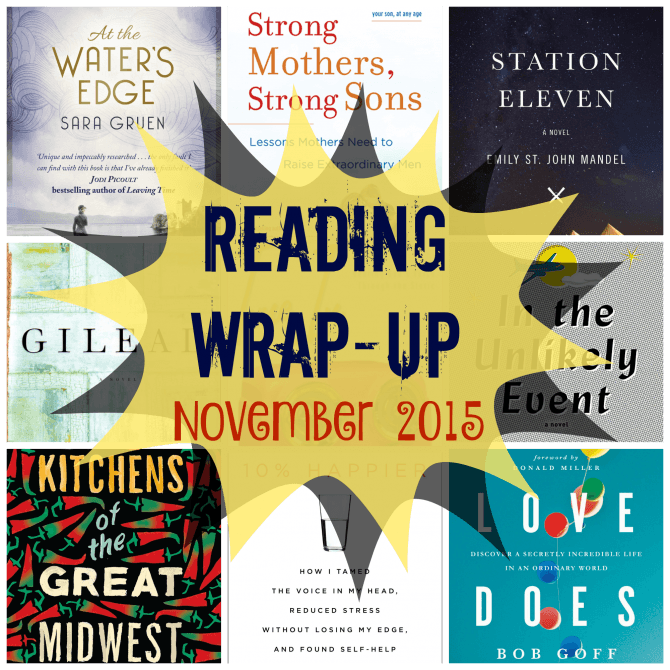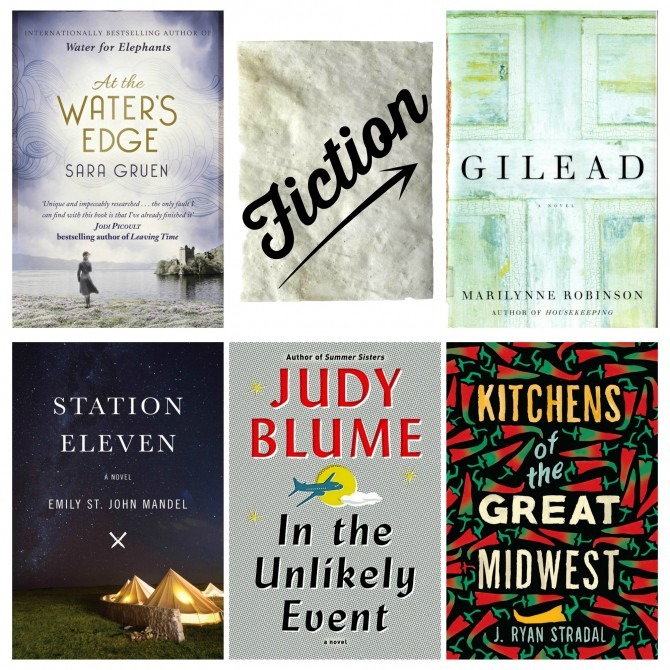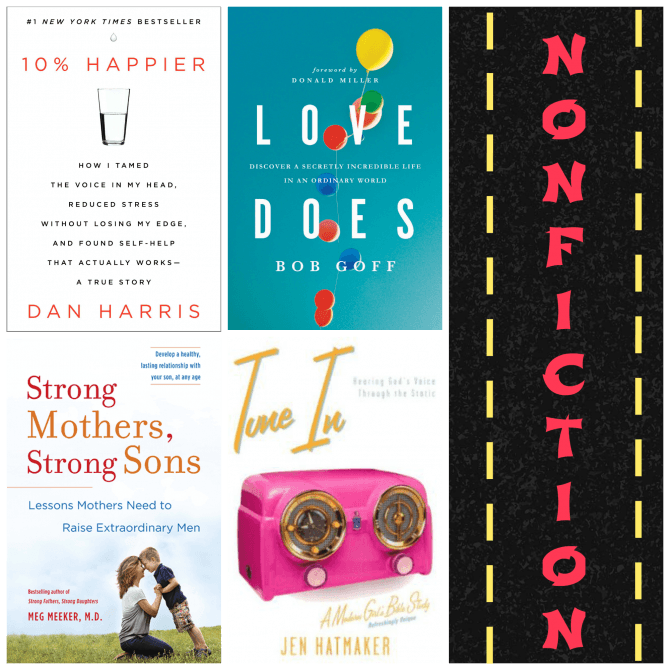As we head into the Holiday season, I know that I’ll have quite a bit less time for reading, so I’ve spent these past few weeks fitting in as many books as I can. (Although I’m not sure why I feel the need to read as much as insanely possible. . . any other book lovers out there suffer from Read-All-The-Books Syndrome?!) My book selections lately have been as eclectic as ever, though looking at this list I’m noticing some common themes: setting plays a prominent role in the five novels I read this month, and all four of my nonfiction reads incorporate spiritual elements. So perhaps my reading is more predictable than I’d realized. Here’s a look at the books I’ve read over the past month.
FICTION
Gilead, by Marilynne Robinson: Told through the letters of an aging preacher who is writing to his young son, Gilead is the story of three generations of men from the Civil War through the 1950s. Character-driven and brimming with poignant thoughts on family, faith, and cultural norms, the beauty of this book lies in its reflective narration and palpable emotion. With its masterful storytelling, subtle humor, and discussion of challenging spiritual topics, Gilead is of a much higher caliber than most other Christian fiction I’ve read. I can understand why this book is beloved by so many readers (including President Obama, who counts it among his favorite books); it is deserving of its depiction as a modern classic. My Rating: 4 stars.
At the Water’s Edge, by Sara Gruen: It has been a few years since I read Water for Elephants, but I remember really enjoying it and was eager to dive into Sara Gruen’s latest historical fiction, set during the Second World War. The book’s narrator is Maddie Hyde, a New York socialite who travels with her husband and best friend to the Scottish Highlands to hunt the Loch Ness monster. As Maddie’s horizons are broadened, she is forced to come to terms with the harsh realities of her marriage and her past. At the Water’s Edge is an engaging read with some beautiful moments. While the novel has a strong sense of time and place, the World War II setting provides a fitting backdrop without overpowering the story—a refreshing change of pace for this genre. Unfortunately the unlikeable characters and graphic sexual scenes detract from what is otherwise a well-crafted novel. My Rating: 3.5 stars.
Station Eleven, by Emily St. John Mandel: A flu pandemic has brought an abrupt end to the world as we know it. Twenty years after the collapse, a traveling group of nomads struggles to move beyond survival mode by investing in the creation and appreciation of art. I’m not generally one to reach for post-apocalyptic fiction, but Station Eleven lives up to its reputation as an atypical survival story, bypassing the action and violence typical of the genre in favor of richly painted characters and psychological reflection. I was deeply impressed with the novel’s unique narrative tone and thought-provoking premise, but I found the story somewhat lacking at points and was left wanting more. I also didn’t care for the meandering timeline, though I’m sure it works better in the non-audio format. My Rating: 4 stars.
In the Unlikely Event, by Judy Blume: This adult novel from beloved children’s author Judy Blume follows the community of Elizabeth, New Jersey, in the winter of 1953: the year in which three separate planes crash into their town, leaving a jumble of devastation and fractured relationships in their wake. Inspired by real events (witnessed by Blume herself), In the Unlikely Event starts offs trong but is quickly derailed by a cacophony of narrators and an infiltration of subplots, all of which detracted from what might have been a riveting depiction of the not-so-glamorous side of 1950s Americana. The book features Blume’s trademark introspection and frankness about uncomfortable issues, which unfortunately doesn’t mesh well with the very adult content of this book. My Rating: 2.5 stars.
Kitchens of the Great Midwest, by J. Ryan Stradal: Kitchens of the Great Midwest indirectly tells the story of Eva, a remarkable Midwestern woman with a “once-in-a-generation palate.” Eva’s transformation from small-town foodie to legendary chef is told via a series of vignettes featuring a unique cast of thoroughly Midwestern characters. The novel’s cohesion lies within the stories’ common themes of food and family, as well as the characters’ loose connections to Eva, who makes a cameo appearance in each narrative. Stradal utilizes humor and remarkable inisght into everyday Americana to capture the rise of a foodie culture in this uniquely structured novel. I would have appreciated fewer loose ends within the various stories, but overall I was impressed by the emotional depth and sensory richness of this literary debut. My Rating: 4 stars.
NONFICTION
Love Does, by Bob Goff: Love Does was my book club’s October pick, and I am so thankful for the motivation to finally pick up this highly acclaimed collection of essays. Bob Goff is a quirky-but-lovable lawyer and human rights activist with an unshakable desire to accept God’s invitation to an action-packed life of passion and whimsy. His book features personal stories that are as hilarious as they are inspiring; many are almost too zany to be believed—and yet, as far as I can tell, they are all true! Goff’s musings are simple, but their messages are profound, and while not every story is a home-run, their cumulative effect is to portray an enticing model of a life that unequivocally and fearlessly embraces—and replicates—Christ’s love. My Rating: 4.5 stars.
10% Happier: How I Tamed the Voice in My Head, Reduced Stress Without Losing My Edge, and Found Self-Help That Actually Works, by Dan Harris: After having a panic attack while reading the news on Good Morning America, anchorman Dan Harris embarked on a quest to make peace with his personal demons. His journey led him to the principles of Buddhism, culminating in his reluctant adoption of meditation. Harris makes a compelling case for taking up a meditation practice, and his explanations are both insightful and intriguing. Unfortunately, the amount of practical information within this book is scarce: though touted as an introduction to meditation, 10% Happier is more memoir than tutorial, and I found very little in Harris’s story to hold my attention or garnish my sympathies. Final verdict: there are some gems here, but it wasn’t worth weeding through Harris’s name-dropping and navel-gazing to get to them. My Rating: 2.5 stars.
Tune In, by Jen Hatmaker: My weekly Bible study used Tune In as our study guide this semester. In the past, our group has focused on a single book of the Bible, so it was nice to shake things up a bit with a topical study, and I was excited by the choice to do a study from Jen Hatmaker since I love her quirky writing style and sense of humor. The study did not disappoint: perceptive and relatable, it incorporates a variety of Biblical illustrations and personal anecdotes to effectively address the challenging subject of how we hear from God. Sprinkled throughout each chapter are thought-provoking study questions (and none of the mindless fill-in-the-blanks found in so many Bible studies). Tune In contains enough content to be used as an independent study, but it worked well as a group guide, fostering rich discussion and providing a healthy framework for our weekly teaching times. The book’s main drawback is that it is meant to be a study guide, but offers very little space for writing. I also felt that Hatmaker could have delved deeper into the various subtopics, but the length worked well for a semester-long study. My Rating: 4 stars.
Strong Mothers, Strong Sons, by Meg Meeker: In this comprehensive book about raising sons, pediatrician Meg Meeker uses stories from her medical practice to guide and encourage moms as we navigate the challenges and hurdles related to raising sons. The book addresses a range of emotional and practical issues and offers useful tips on how moms and sons can establish healthy, life-long relationships grounded in faith and integrity. (And while the book is geared towards moms raising sons, much of the advice is non-gender specific and would be applicable to all parents raising either boys or girls.) A number of issues discussed in the book have me a bit scared about the future, but it was good for me to get a glimpse of what might lie in store for Charlie and me so that we can take proactive measures as they relate to potential problems.
Luke bought a hard cover copy of this book for me when we found out we were having a baby boy, but I actually wound up listening to the audio version from the library; parts of the book were repetitive, which made it great for audio, but it was nice to also have a physical copy of the book on hand to refer to during some of the more tedious portions. This is one book I know I’ll be referencing frequently as more boy-centric issues arise in bringing up Charlie, so I’m glad to have a physical copy on our bookshelf. My Rating: 4 stars.
If you’ve read any of these titles, I’d love it if you left a comment sharing your thoughts! And if you’d like to read an abundance of book reviews from bloggers across the web, check Modern Mrs. Darcy’s blog where I’m joining up with her monthly Quick Lit link-up.


